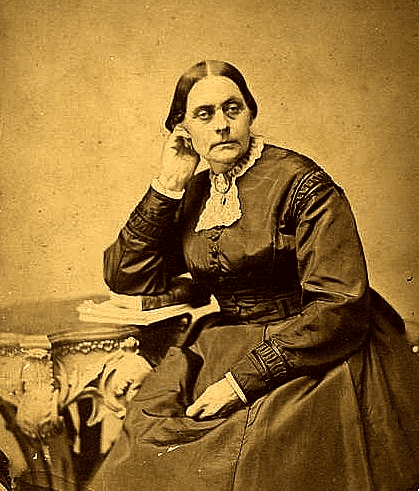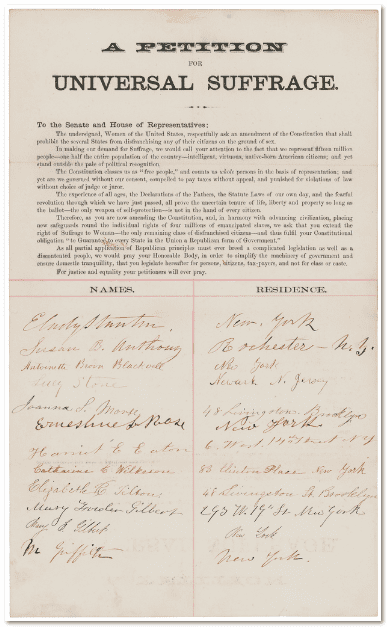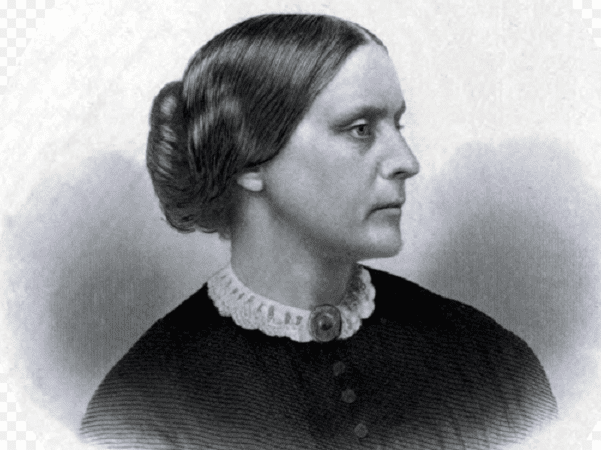Introduction: In this article—in honor of March being National Women’s History Month—Gena Philibert-Ortega commemorates the 108th anniversary of the death of women’s rights advocate Susan B. Anthony. Gena is a genealogist and author of the book “From the Family Kitchen.”
1920. That isn’t really that long ago. In the United States, women have had the right to vote in federal elections for less than 100 years. Depending on your age, there’s a good chance that your grandmother or great-grandmother spent part of her life without that right. Women today have many foremothers to thank for their work in securing suffrage. One woman, whose name is familiar to most of us, dedicated her life to suffrage—and like many of those who fought that fight, she never saw her dream fully realized.
On 13 March 1906 pioneering activist Susan B. Anthony died at the age of 86.

When she was 52, Anthony was arrested, tried and convicted for the crime of daring to vote in the 1872 Presidential Election. She persisted in her efforts with unwavering dedication, declaring a few years before she died that national women’s suffrage “…will come, but I shall not see it.”
Her words proved prophetic 14 years after her death, when the Nineteenth Amendment to the U.S. Constitution was ratified on 18 August 1920, guaranteeing all American women the right to vote.

Quaker by birth, social reform causes were not unknown to her. Susan B. Anthony spoke her mind about various causes during her life including slavery, which she spoke out against when she was only 17 years old.
History of Woman Suffrage
One of the results of her tireless work is a book series, History of Woman Suffrage, which Anthony co-authored with fellow suffragists Matilda Joslyn Gage and Elizabeth Cady Stanton. This set is not only a good history of the cause; it provides valuable information to present-day researchers on the dates women received suffrage on a local and state level. The series is available online through digitized books websites including Google Books and Internet Archive.
Genealogy Tip: Be sure to consult this book series to better understand what voting records may be available for your female ancestors.
Obituary of Susan B. Anthony
When she died, Susan B. Anthony’s obituary was published in newspapers throughout the United States. Her obituary listed her many life accomplishments, including: lecturing in 1847 on behalf of temperance; her work towards the abolition of slavery prior to the Civil War; and her taking a “prominent part in the passage of an act in New York giving married women the possession of their earnings and right of guardianship of their children.”
Even in death Anthony was breaking down gender and race barriers. An African American woman, Mrs. R. Jerome Jeffrey, spoke at her funeral, and the honorary pall bearers were young women from the University of Rochester. Anthony helped to secure coeducation privileges for women at that institution just prior to her death.
Even though she did not live to see women gain the federal right to vote, she had worked with women in other states that did enjoy suffrage in state and local elections. Women in the Western states of Wyoming (1869), Utah (1870), Colorado (1893), and Idaho (1896) were some of the first to hold the right to vote in state elections.
In 1920 the 19th Amendment was ratified after a 41-year-long battle. Originally penned by Anthony and Stanton, the text for the 19th Amendment was known as the Anthony Amendment. Years of women’s, and some men’s, hard work which involved marches, pickets, demonstrations, arrests, and even being tortured ended with the adoption of this sentence:
The right of citizens of the United States to vote shall not be denied or abridged by the United States or by any State on account of sex.
Susan B. Anthony’s Grave
Susan B. Anthony is buried in the Anthony family plot at Mount Hope Cemetery in Rochester, New York. Abolitionist Frederick Douglas is also buried at Mount Hope.
Interesting history fact: Tennessee ratified the 19th Amendment in 1920, giving the amendment the 36 approval votes it needed to pass. However, some states didn’t ratify it until much later; the last state, Mississippi, didn’t ratify the 19th Amendment until 1984. That’s not a typo—it wasn’t until 1984!
